最新中国饮食文化中英文PPT精选文档
- 格式:ppt
- 大小:4.12 MB
- 文档页数:31
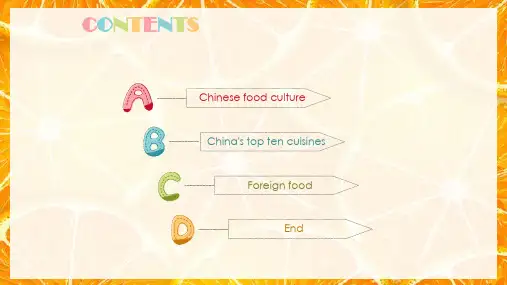
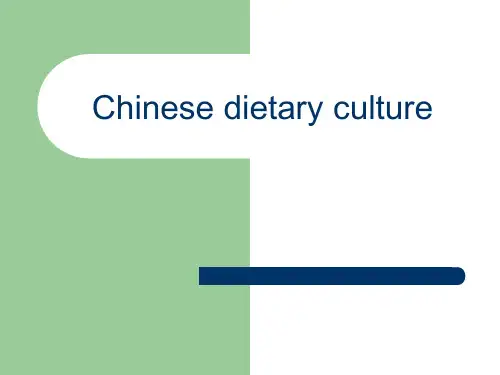
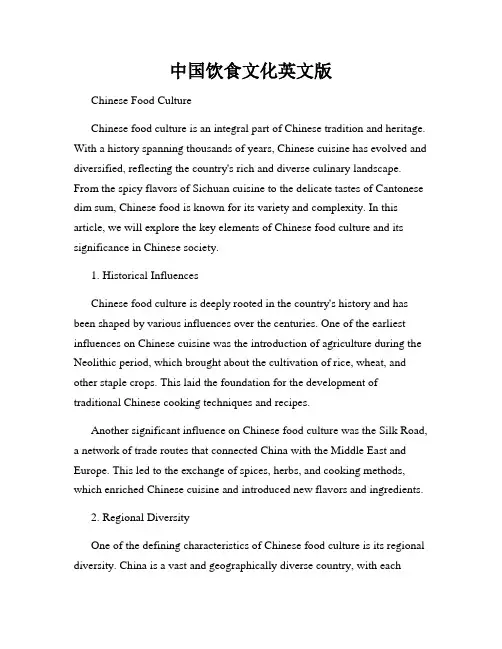
中国饮食文化英文版Chinese Food CultureChinese food culture is an integral part of Chinese tradition and heritage. With a history spanning thousands of years, Chinese cuisine has evolved and diversified, reflecting the country's rich and diverse culinary landscape. From the spicy flavors of Sichuan cuisine to the delicate tastes of Cantonese dim sum, Chinese food is known for its variety and complexity. In this article, we will explore the key elements of Chinese food culture and its significance in Chinese society.1. Historical InfluencesChinese food culture is deeply rooted in the country's history and has been shaped by various influences over the centuries. One of the earliest influences on Chinese cuisine was the introduction of agriculture during the Neolithic period, which brought about the cultivation of rice, wheat, and other staple crops. This laid the foundation for the development of traditional Chinese cooking techniques and recipes.Another significant influence on Chinese food culture was the Silk Road, a network of trade routes that connected China with the Middle East and Europe. This led to the exchange of spices, herbs, and cooking methods, which enriched Chinese cuisine and introduced new flavors and ingredients.2. Regional DiversityOne of the defining characteristics of Chinese food culture is its regional diversity. China is a vast and geographically diverse country, with eachregion having its own unique culinary traditions and specialties. For example, the spicy and numbing flavors of Sichuan cuisine are a stark contrast to the light and fresh flavors of Shandong cuisine.Each region in China has its own distinct ingredients, cooking styles, and flavor profiles, which are influenced by local customs, climate, and geography. This regional diversity has contributed to the richness and depth of Chinese cuisine, making it one of the most diverse and vibrant culinary traditions in the world.3. Social SignificanceIn Chinese culture, food is not just sustenance but also a symbol of social connections and harmony. Shared meals play a central role in Chinese social life, bringing families and communities together to celebrate festivals, weddings, and other important occasions. The act of preparing and sharing food is seen as a way to strengthen bonds and foster relationships.Food also holds symbolic significance in Chinese culture, with certain dishes and ingredients representing prosperity, happiness, and good fortune. For example, fish is often served whole during Lunar New Year celebrations to symbolize abundance and prosperity, while dumplings are eaten to usher in wealth and good luck.4. Traditional PracticesChinese food culture is steeped in tradition, with many customs and practices that have been passed down through generations. One such practice is the concept of "balance" in Chinese cuisine, which emphasizes the harmony of flavors, textures, and colors in a meal. It is believed that a well-balanced meal not only nourishes the body but also balances the body's energy and promotes good health.Another traditional practice in Chinese food culture is the use of food as medicine. Many ingredients in Chinese cuisine, such as ginseng, goji berries, and lotus seeds, are believed to have healing properties and are used in traditional Chinese medicine to treat various ailments.5. Modern TrendsWhile Chinese food culture is steeped in tradition, it has also evolved and adapted to changing tastes and lifestyles. In recent years, there has been a growing interest in healthy eating and sustainable food practices in China, leading to the popularity of organic and locally sourced ingredients.The rise of food delivery services and online platforms has also transformed the way Chinese people eat, making it easier to access a wide range of cuisines from the comfort of their homes. Despite these changes, traditional Chinese food culture continues to thrive, with a renewed interest in preserving and promoting the country's culinary heritage.In conclusion, Chinese food culture is a reflection of the country's rich history, regional diversity, and social values. With its emphasis on balance, harmony, and tradition, Chinese cuisine remains one of the most vibrant and enduring culinary traditions in the world. By exploring the key elements of Chinese food culture, we can gain a deeper appreciation for the role that food plays in Chinese society and its significance in everyday life.。
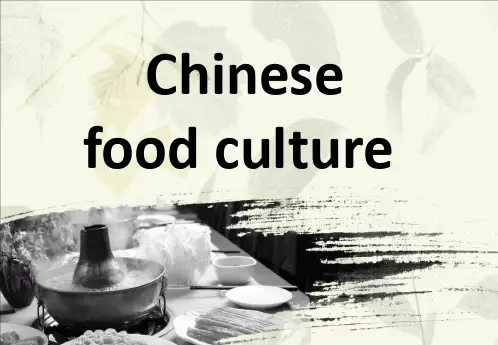

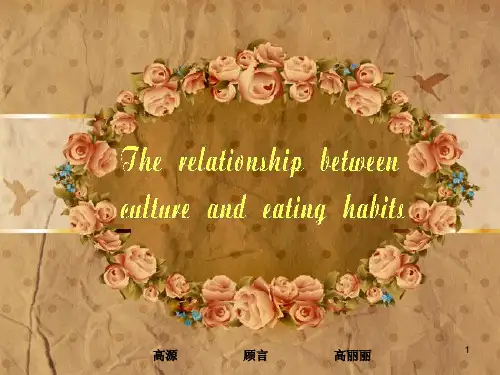
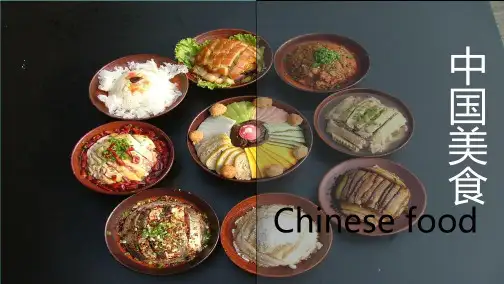
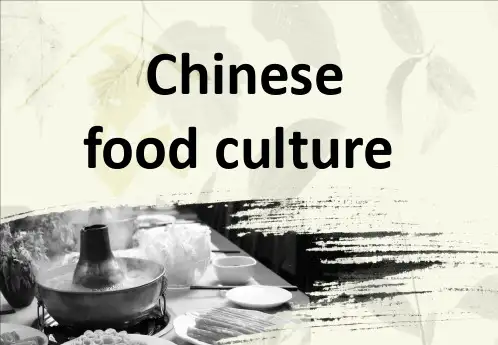

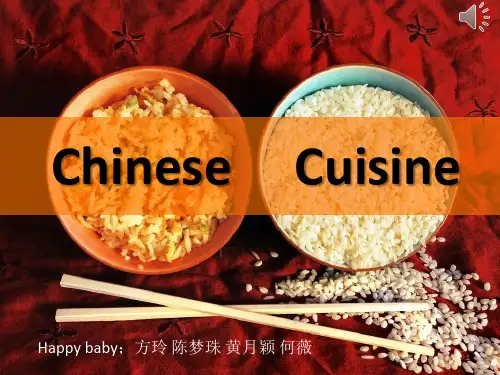
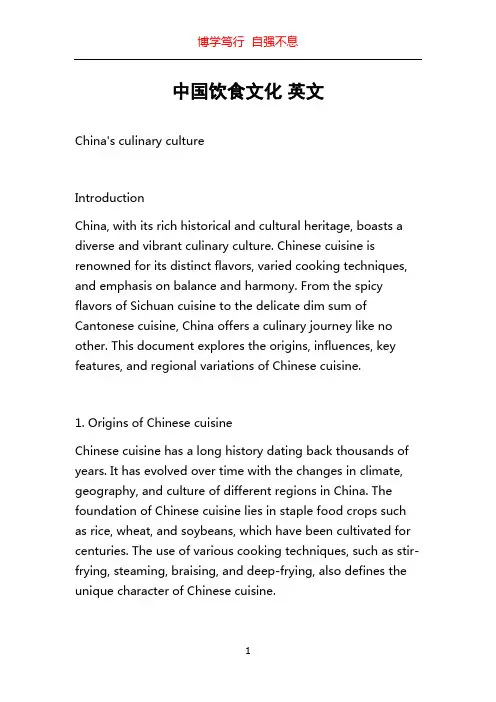
中国饮食文化英文China's culinary cultureIntroductionChina, with its rich historical and cultural heritage, boasts a diverse and vibrant culinary culture. Chinese cuisine is renowned for its distinct flavors, varied cooking techniques, and emphasis on balance and harmony. From the spicy flavors of Sichuan cuisine to the delicate dim sum of Cantonese cuisine, China offers a culinary journey like no other. This document explores the origins, influences, key features, and regional variations of Chinese cuisine.1. Origins of Chinese cuisineChinese cuisine has a long history dating back thousands of years. It has evolved over time with the changes in climate, geography, and culture of different regions in China. The foundation of Chinese cuisine lies in staple food crops such as rice, wheat, and soybeans, which have been cultivated for centuries. The use of various cooking techniques, such as stir-frying, steaming, braising, and deep-frying, also defines the unique character of Chinese cuisine.2. Influences on Chinese cuisineChinese cuisine has been influenced by various factors throughout history. The Silk Road, an ancient trade route connecting China with the West, played a significant role in introducing new ingredients and cooking techniques to Chinese cuisine. The Mongol rule during the Yuan Dynasty brought an influx of Central Asian flavors, while the Manchu rulers of the Qing Dynasty influenced the development of Manchurian-style cuisine. Additionally, Chinese cuisine has been shaped by the influence of neighboring countries such as Japan, Korea, and Vietnam.3. Key features of Chinese cuisineChinese cuisine is characterized by its emphasis on harmony and balance in flavors, colors, and food textures. The concept of Yin and Yang, representing the balance of contrasting elements, is deeply embedded in Chinese culinary traditions. This balance is achieved through the combination of different flavors, including sweet, salty, sour, bitter, and umami. Chinese cuisine also places great importance on the freshness and quality of ingredients, with an emphasis on seasonal produce and locally sourced meats and vegetables.4. Regional variations of Chinese cuisineChina's vast size and diverse geography have given rise to distinct regional culinary traditions. Each region has its own unique flavors, cooking techniques, and ingredients. Some of the most renowned regional cuisines include Sichuan cuisine, known for its bold and spicy flavors; Cantonese cuisine, famous for its fresh seafood and delicate dim sum; and Shandong cuisine, which emphasizes the use of seafood and a wide range of cooking methods. Other notable regional cuisines include Hunan, Fujian, Jiangsu, and Zhejiang.5. Cultural significance of Chinese cuisineChinese cuisine holds significant cultural and social importance in China. Food is seen as more than just sustenance; it is a reflection of social status, harmony, and hospitality. Chinese banquets, with their elaborate presentation and wide variety of dishes, are an integral part of Chinese culture and are often held during festive occasions or to celebrate special events. Moreover, the shared act of consuming food is seen as a way to strengthen social bonds and foster harmony within families and communities.ConclusionChinese cuisine is a testament to China's rich culinary traditions and cultural heritage. From the abundance of flavors and textures to the artful presentation and regional variations, Chinese cuisine offers a wealth of culinaryexperiences. Whether indulging in the spicy and bold flavors of Sichuan cuisine or savoring the delicate and refined dim sum of Cantonese cuisine, exploring Chinese cuisine is a journey that will truly tantalize the taste buds.。